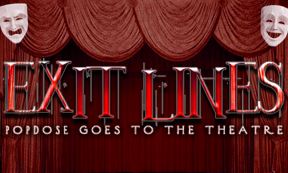 From the blockbuster album by Alanis Morissette Jagged Little Pill is bookended by scenes at Christmas, but you’re unlikely to be of good cheer as the story unfolds. Hyper-controlling Mary Jane Healy (Elizabeth Stanley) is writing her annual year-end newsletter from her Connecticut abode, willfully oblivious that her nuclear family is set to explode. Despondent over their sexless marriage husband Steve (Sean Allan Krill) busies himself with work and online porn. Son Nick (Derek Klena) is going to Harvard but, imprisoned by expectations, feels he’s going nowhere. Adopted black daughter Frankie (Celia Rose Gooding) is flirting with bisexuality and actively engaged in student protests at her high school.
From the blockbuster album by Alanis Morissette Jagged Little Pill is bookended by scenes at Christmas, but you’re unlikely to be of good cheer as the story unfolds. Hyper-controlling Mary Jane Healy (Elizabeth Stanley) is writing her annual year-end newsletter from her Connecticut abode, willfully oblivious that her nuclear family is set to explode. Despondent over their sexless marriage husband Steve (Sean Allan Krill) busies himself with work and online porn. Son Nick (Derek Klena) is going to Harvard but, imprisoned by expectations, feels he’s going nowhere. Adopted black daughter Frankie (Celia Rose Gooding) is flirting with bisexuality and actively engaged in student protests at her high school.
Want more? Her putative girlfriend, Jo (Lauren Patten), cracks wise to conceal her breaking heart, as Frankie crushes on Phoenix (Antonio Cipriano), who’s trying to keep up with the wokeness. Then meet high school acquaintance Bella (Kathryn Gallagher), who gets drunk at a party and is sexually assaulted by a wealthy, connected friend of Nick’s. Nick saw what happened, failed to act, and broods as the incident is relayed on social media. That’s a lot for one Christmas newsletter, but Mary Jane isn’t seeing much of anything–addicted as she is to opioids she’s getting from street hustlers now that her prescription has run out.
One part Next to Normal (frazzled, pill-popping mom; that show’s Tony- and Pulitzer-winning composer, Tom Kitt, is this show’s music supervisor) and one part Dear Evan Hansen (YA torment), this isn’t your average singalong jukebox musical, which is always a plus. Morissette’s album, still potent after 25 years, and augmented by songs from her other recordings and new material, has been filtered through the edgy indie movie sensibility of book writer Diablo Cody (Juno). But the collaboration is only fitfully satisfying. Cody’s witticisms (which, amusingly, don’t spare the songwriter’s lyrics, as Frankie’s writing class dissects “Ironic” while performing it) are better suited to supporting characters like Jo than Mary Jane, who’s a jagged little pill alright. In screenplays like Young Adult and Tully, Cody is able to skirt the nettlesome issue of “likability” by having the high wattage Charlize Theron play the leads. Like the rest of the cast Stanley is proficient but earthbound, and mildly annoying. With Cody reeling off the zingers to lighten the load we never fully invest in self-absorbed Mary Jane and her family, and the revelation that’s meant to bind the two generations of the show doesn’t pack the necessary punch. It’s just one more trauma that needs unpacking and airing until the next Christmas newsletter.
But. Director Diane Paulus, of the Tony-winning revivals of Hair and Pippin, keeps the piece moving visually, with an invaluable assist from choreographer Sidi Larbi Cherkkaoui, whose balletic, kinetic reenactment of the date rape is a chilling sequence. Patten’s second-act rendition of “You Oughta Know” raises the roof and temporarily gets us on our feet, and there are other moments where Jagged Little Pill, the musical, has a rhythm of its own. Misfire? Sort of. An ambitious one, however.
Midway through the first act of the two-part, six-and-a-half-hour behemoth that is The Inheritance, the characters, young gay men in a college writing class, congregate around the communal table that is the principal set and argue about the problems of their lives in our era: discrimination, representation, poverty. Any of these might have made for a lively hour, but then we’re back to The Inheritance, too much of which plays like a half-season of the melodramatic Queer as Folk cable TV show, binge-watched live.
I haven’t seen playwright Matthew Lopez’s other work, but this is a swing at the fences, and it hit in the West End. Given its length and fantasy elements it’s been compared to Angels in America, but the contrasts are more revealing. Tony Kushner’s “gay fantasia” was rooted in anger as the age of AIDS raged, deeply political at its core, and drew blood from its fully realized characters. As its title indicates The Inheritance lives off the blighted legacy of the 80s and early 90s, and at its best shows how the past commingles with the present. But the primary mode is soap opera, with flatly drawn people. (That the actors, some quite good despite the limits of the text, are all rather hunky adds to an air of superficiality.)
 The show begins with that writing class, as the students struggle to commit their stories to the page and discuss the strengths and limitations of E.M. Forster, that closeted literary pathfinder. Played with a fusty curiousity by Paul Hilton, Forster appears (as “Morgan”) and offers words of counsel and advice, sometimes defensively, as the classmates morph into the characters of one student’s imagination…look, just go with it, it makes sense enough onstage. In rough outline The Inheritance takes the shape of Forster’s Howards End, and if you haven’t read the book, or seen the Oscar-winning film or recent cable miniseries, relax, the essentials are conveyed (as they are with his openly homosexual, but suppressed, Maurice, in the cram session parts of the show). But this is not your great-grandfather’s Howards End.
The show begins with that writing class, as the students struggle to commit their stories to the page and discuss the strengths and limitations of E.M. Forster, that closeted literary pathfinder. Played with a fusty curiousity by Paul Hilton, Forster appears (as “Morgan”) and offers words of counsel and advice, sometimes defensively, as the classmates morph into the characters of one student’s imagination…look, just go with it, it makes sense enough onstage. In rough outline The Inheritance takes the shape of Forster’s Howards End, and if you haven’t read the book, or seen the Oscar-winning film or recent cable miniseries, relax, the essentials are conveyed (as they are with his openly homosexual, but suppressed, Maurice, in the cram session parts of the show). But this is not your great-grandfather’s Howards End.
Much of the show is communicated via direct address, with the characters speaking directly to the audience. It’s a litmus test for showing vs. telling, but soon enough who’s who is sorted. Driving the storyline is a tumult-wracked couple, Eric (Kyle Soller), an earnest social justice warrior, and writer Toby Darling (Andrew Burnap), who’s simply at war, with Eric, anyone in the entertainment rackets who are trying to mold him, and the weaker-willed men he abuses. If you thought the Healys, or Wheeler, the protagonist of Tracy Letts’ Linda Vista, were a handful you’ll recoil from Toby, and while Burnap gives his all to the part I tended to look away during his bitchily written rampages. It emerges–no surprise–that Toby is mostly at war with himself, and is lost in a cycle of victimhood and victimization. The point is made in the first act, as Toby corrupts a young man into lurid, and unsafe, sexual encounters…then Lopez makes it again in the second act, with the same actor, playing a different character, reenacting the exact same trauma at Toby’s behest. Once was more than enough, and I couldn’t help but feel that Lopez was getting off on this nightmarish sexual fantasy.
The show is better when Toby is sidelined. Eric’s journey takes him an eyebrow-raising relationship with a rich, older Republican (John Benjamin Hickey), who holds the keys to a property held in almost mystic regard. I’m skipping a lot of turgid synopsis here, but suffice it to say Eric eventually find his way there, where in the second act he meets its elderly caretaker, who, in a nod to Forster, is named Margaret (the only woman in the show). On the West End the part was played by the film’s co-star Vanessa Redgrave, but here we have our own living legend, Lois Smith, as a woman who failed her own gay son as the epidemic hit and has spent the rest of her life helping other AIDS patients seeking refuge and solace. Any minute spent with Lois Smith, 89, is a minute to treasure, and this sequence is a lovely interlude.
In truth, however, if The Inheritance had ended after its first act, leaving all the tedious drama to come behind, it would have been all the stronger and more affecting. In a final, wrenching tableau of men living and dead coming together in a ghostly communion, the show (directed by Stephen Daldry, and graced, like the London imports Betrayal and A Christmas Carol, with a clean, expressive, nothing-wasted design, here arranged by the great Bob Crowley) reaches the summit of its achievement. Even with Lois Smith waiting in the wings there’s nowhere for it to go but down, but for a few minutes we “only connect,” as Forster would have wanted.
Finally, a few words on A Christmas Carol, and a few more on Cats, the movie, which maybe isn’t the dog that you’ve heard. Everyone’s a critic as 2019 draws to a close–thanks for reading.





Comments